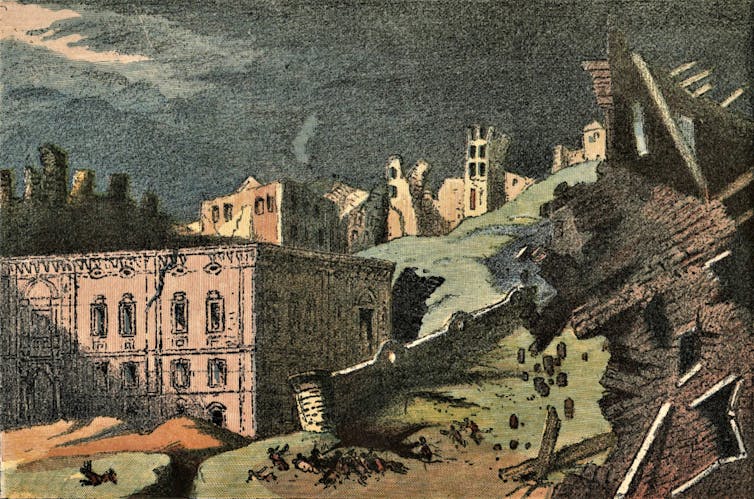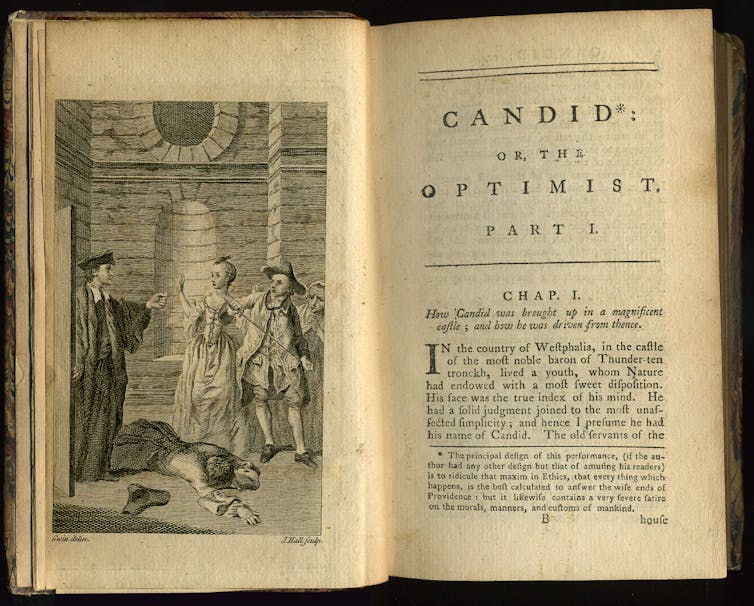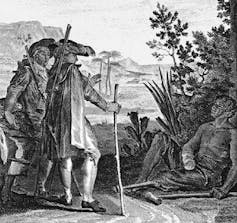Voltaire’s Candide — a darkly satirical tale of human folly in times of crisis
- Written by Matthew Sharpe, Associate Professor in Philosophy, Deakin University
“Italy had its renaissance, Germany its reformation, France had Voltaire”, the historian Will Durant once commented.
Born François-Marie Arouet, Voltaire (1694-1778) was known in his lifetime as the “patriarch” of the French enlightenment. A man of extraordinary energy and abilities, he produced some 100 volumes of poetry, fiction, theatre, biblical and literary criticism, history and philosophy.
Among his myriad works, Voltaire’s Candide, or Optimism (1759) is widely recognised as the masterpiece. A darkly satirical novella taking aim at human folly, pride and excessive faith in reason’s ability to plumb the deepest metaphysical truths, it remains as telling in this era of pandemics and wild conspiracy theories as when first published.
Read more: Criticism of Western Civilisation isn't new, it was part of the Enlightenment
Theological shockwaves
In his earlier works Voltaire had propounded an almost naive optimism, but the decade from 1749-1759 was not easy for the philosopher-author.
 Personally, his great love, Émilie du Châtelet had died in 1749. Politically, he had been forced from exile to exile for his criticism of monastic and clerical privileges in France and his Essay on Universal History, the Manners, and Spirit of Nations (1756), which treated Christianity as just one world religion, rather than the final revealed truth.
In 1755, meanwhile, on November 1, a huge earthquake had struck the Portugese capital, Lisbon, followed by a tsunami. Within minutes, tens of thousands were dead.
The recriminations soon began. Protestants saw in Lisbon’s destruction divine judgement on Catholicism. Catholics proposed, with equal implausibility, the especial sinfulness of the Lisbonites as the disaster’s cause. Pyres were erected in the streets to burn heretics, as scapegoats for the disaster.
This combination of senseless death and even more senseless human responses outraged Voltaire. His first response was the impassioned “Poem on the Lisbon Disaster” of 1755:
As the dying voices call out, will you dare respondTo this appalling spectacle of smoking ashes with, […] ‘God is avenged. Their death is the price of their crimes’?
Then, several years later, came Candide.
Personally, his great love, Émilie du Châtelet had died in 1749. Politically, he had been forced from exile to exile for his criticism of monastic and clerical privileges in France and his Essay on Universal History, the Manners, and Spirit of Nations (1756), which treated Christianity as just one world religion, rather than the final revealed truth.
In 1755, meanwhile, on November 1, a huge earthquake had struck the Portugese capital, Lisbon, followed by a tsunami. Within minutes, tens of thousands were dead.
The recriminations soon began. Protestants saw in Lisbon’s destruction divine judgement on Catholicism. Catholics proposed, with equal implausibility, the especial sinfulness of the Lisbonites as the disaster’s cause. Pyres were erected in the streets to burn heretics, as scapegoats for the disaster.
This combination of senseless death and even more senseless human responses outraged Voltaire. His first response was the impassioned “Poem on the Lisbon Disaster” of 1755:
As the dying voices call out, will you dare respondTo this appalling spectacle of smoking ashes with, […] ‘God is avenged. Their death is the price of their crimes’?
Then, several years later, came Candide.
 A depiction of the Great Lisbon Earthquake of November 1, 1755.
Wikimedia Commons
A simple lad
As his name suggests, Voltaire’s hero, Candide, is a simple lad. Raised in a magnificent castle in Westphalia, in North-Western Germany, he is moved by just two passions. The first is abiding love for his sweetheart, Cunégonde.
The second is admiration for his teacher, Pangloss (“all tongue”), an exalted Professor of “métaphysico-théologo-cosmolonigologie” possessed of the happy ability to explain everything that happens, despite appearances, as “for the best”.
It is demonstrable,“ said he, "that things cannot be otherwise than as they are; for […] all is necessarily for the best end. Observe, that the nose has been formed to bear spectacles — thus we have spectacles. Legs are visibly designed for stockings — and we have stockings […] Pigs were made to be eaten — therefore we eat pork all the year round. Consequently, they who assert that all is well have said a foolish thing, they should have said: all is for the best.”
In Pangloss, Voltaire is satirising German philosopher Gottfried Wilhelm Leibniz and the British poet, Alexander Pope.
These two men had defended what the former called “theodicy”: the idea that a perfect God could only have created the best possible world. Hence, the human perception that events like pandemics, earthquakes, massacres and tsunamis are bad must be mistaken.
Read more:
Floods and fires: the struggle to rebuild, the search for meaning
A depiction of the Great Lisbon Earthquake of November 1, 1755.
Wikimedia Commons
A simple lad
As his name suggests, Voltaire’s hero, Candide, is a simple lad. Raised in a magnificent castle in Westphalia, in North-Western Germany, he is moved by just two passions. The first is abiding love for his sweetheart, Cunégonde.
The second is admiration for his teacher, Pangloss (“all tongue”), an exalted Professor of “métaphysico-théologo-cosmolonigologie” possessed of the happy ability to explain everything that happens, despite appearances, as “for the best”.
It is demonstrable,“ said he, "that things cannot be otherwise than as they are; for […] all is necessarily for the best end. Observe, that the nose has been formed to bear spectacles — thus we have spectacles. Legs are visibly designed for stockings — and we have stockings […] Pigs were made to be eaten — therefore we eat pork all the year round. Consequently, they who assert that all is well have said a foolish thing, they should have said: all is for the best.”
In Pangloss, Voltaire is satirising German philosopher Gottfried Wilhelm Leibniz and the British poet, Alexander Pope.
These two men had defended what the former called “theodicy”: the idea that a perfect God could only have created the best possible world. Hence, the human perception that events like pandemics, earthquakes, massacres and tsunamis are bad must be mistaken.
Read more:
Floods and fires: the struggle to rebuild, the search for meaning
 Frontispiece and first page of an early English translation by T. Smollett et al. of Voltaire’s Candide, 1762.
Wikimedia Commons
Candide’s fate is set up by Voltaire as a reductio ad absurdum (reduction to absurdity) of this optimistic theory. Our hero is first expelled from his Edenic childhood garden, when Cunégonde’s father comes upon she and Candide illicitly experimenting in what Voltaire delicately calls “natural philosophy”.
In Candide’s ensuing wanderings around Europe and the Americas, Voltaire treats his hero to a veritable guided tour of all of the evils of war, lust, avarice, vanity and colonialism.
Fleeing war, rapine and zealotry in Bulgaria and Holland, Candide arrives in Lisbon just in time for the earthquake. He is selected for execution by fire as a heretic, before escaping to save Cunégonde from disputing, lustful representatives of the West’s two great biblical faiths, Judaism and Christianity.
The lovers flee together to the Americas. In Buenos Aires, however, the Spanish governor seizes Cunégonde for his wife. Candide and his servant, Cacambo, are forced to flee through yet more bloody misadventures in the new world.
In a rightly famous passage, which finally sees Candide recant of his teacher Pangloss’ theodicy as the “abomination […] of maintaining that everything is right when it is wrong”, they come upon a crippled African slave whose masters are Dutch merchants in Surinam:
“Yes, sir,” said the negro, “it is the custom. […] When we work at the sugar-canes, and the mill snatches hold of a finger, they cut off the hand; and when we attempt to run away, they cut off the leg; both cases have happened to me. This is the price at which you eat sugar in Europe.”
Frontispiece and first page of an early English translation by T. Smollett et al. of Voltaire’s Candide, 1762.
Wikimedia Commons
Candide’s fate is set up by Voltaire as a reductio ad absurdum (reduction to absurdity) of this optimistic theory. Our hero is first expelled from his Edenic childhood garden, when Cunégonde’s father comes upon she and Candide illicitly experimenting in what Voltaire delicately calls “natural philosophy”.
In Candide’s ensuing wanderings around Europe and the Americas, Voltaire treats his hero to a veritable guided tour of all of the evils of war, lust, avarice, vanity and colonialism.
Fleeing war, rapine and zealotry in Bulgaria and Holland, Candide arrives in Lisbon just in time for the earthquake. He is selected for execution by fire as a heretic, before escaping to save Cunégonde from disputing, lustful representatives of the West’s two great biblical faiths, Judaism and Christianity.
The lovers flee together to the Americas. In Buenos Aires, however, the Spanish governor seizes Cunégonde for his wife. Candide and his servant, Cacambo, are forced to flee through yet more bloody misadventures in the new world.
In a rightly famous passage, which finally sees Candide recant of his teacher Pangloss’ theodicy as the “abomination […] of maintaining that everything is right when it is wrong”, they come upon a crippled African slave whose masters are Dutch merchants in Surinam:
“Yes, sir,” said the negro, “it is the custom. […] When we work at the sugar-canes, and the mill snatches hold of a finger, they cut off the hand; and when we attempt to run away, they cut off the leg; both cases have happened to me. This is the price at which you eat sugar in Europe.”
 Candide and Cacambo meet a maimed slave of a sugar mill near Surinam.
Wikimedia Commons
To this Europe, the increasingly disillusioned Candide returns. The riches he acquired in the new world are soon fleeced by cunning social climbers in Paris and Venice. He is reunited with Pangloss, who has recanted nothing of his optimism, despite being enslaved, flogged, hanged and brutally maimed, explaining that “I am a philosopher and I cannot retract […]”
Soon enough, Candide also hears news that Cunégonde is now a slave in Turkey, after her own litany of unlikely sufferings. So, he hits the road one last time. Reunited at last with his half-broken beloved, they retire to a little farm with their friends near Constantinople.
Here, despite everything, Pangloss still sometimes comes to mindlessly philosophise, as the story famously closes:
“There is a concatenation of events in this best of all possible worlds: for if you had not been kicked out of a magnificent castle for love of Miss Cunegonde: if you had not been put into the Inquisition: if you had not walked over America: […] if you had not lost all your sheep from the fine country of El Dorado: you would not be here eating preserved citrons and pistachio-nuts.”
“All that is very well,” answered Candide, “but let us cultivate our garden.”
Laughter
In the entry on “wit” (esprit) in his famous Philosophical Dictionary of 1764, Voltaire reflects that it is:
the art either of bringing together two things apparently remote, or of dividing two things which seem to be united, or of opposing them to each other […]
It is the art of Voltaire’s Candide to leave readers unsure whether they should be weeping, screaming, laughing or all at the same time. Atrocious sufferings are recounted with the innocence of a children’s fairy tale.
Elevated questions of metaphysical philosophy, which for a century had divided the greatest Western minds, are brought crashing down to earth amid the clamours of warring armies, collapsing cities, inhumane barbarism and slavery.
Candide and Cacambo meet a maimed slave of a sugar mill near Surinam.
Wikimedia Commons
To this Europe, the increasingly disillusioned Candide returns. The riches he acquired in the new world are soon fleeced by cunning social climbers in Paris and Venice. He is reunited with Pangloss, who has recanted nothing of his optimism, despite being enslaved, flogged, hanged and brutally maimed, explaining that “I am a philosopher and I cannot retract […]”
Soon enough, Candide also hears news that Cunégonde is now a slave in Turkey, after her own litany of unlikely sufferings. So, he hits the road one last time. Reunited at last with his half-broken beloved, they retire to a little farm with their friends near Constantinople.
Here, despite everything, Pangloss still sometimes comes to mindlessly philosophise, as the story famously closes:
“There is a concatenation of events in this best of all possible worlds: for if you had not been kicked out of a magnificent castle for love of Miss Cunegonde: if you had not been put into the Inquisition: if you had not walked over America: […] if you had not lost all your sheep from the fine country of El Dorado: you would not be here eating preserved citrons and pistachio-nuts.”
“All that is very well,” answered Candide, “but let us cultivate our garden.”
Laughter
In the entry on “wit” (esprit) in his famous Philosophical Dictionary of 1764, Voltaire reflects that it is:
the art either of bringing together two things apparently remote, or of dividing two things which seem to be united, or of opposing them to each other […]
It is the art of Voltaire’s Candide to leave readers unsure whether they should be weeping, screaming, laughing or all at the same time. Atrocious sufferings are recounted with the innocence of a children’s fairy tale.
Elevated questions of metaphysical philosophy, which for a century had divided the greatest Western minds, are brought crashing down to earth amid the clamours of warring armies, collapsing cities, inhumane barbarism and slavery.
 Voltaire’s chateau, with garden, at Ferney, where he eventually lived for 20 years.
Wikimedia Commons
It is easy to see why critics have read Voltaire’s novella as a document written in despair. But the laughter of the book suggests this is only half the story.
Voltaire is enraged at human cruelty and idiocy. He scorns the Panglossian pride, which pretends to justify the unjustifiable with blithe self-assurance and vain sophistries. He despises any theory clever enough to explain away human suffering, but not humane enough to decry it.
But this is because he believes human beings can be better. For Voltaire, we can and should challenge all fair-sounding ideologies reconciling us to indignities visited on others we would not accept for ourselves.
Read more:
A moral world in which bad things happen to good people
Let us crush the infamous!
Voltaire’s chateau, with garden, at Ferney, where he eventually lived for 20 years.
Wikimedia Commons
It is easy to see why critics have read Voltaire’s novella as a document written in despair. But the laughter of the book suggests this is only half the story.
Voltaire is enraged at human cruelty and idiocy. He scorns the Panglossian pride, which pretends to justify the unjustifiable with blithe self-assurance and vain sophistries. He despises any theory clever enough to explain away human suffering, but not humane enough to decry it.
But this is because he believes human beings can be better. For Voltaire, we can and should challenge all fair-sounding ideologies reconciling us to indignities visited on others we would not accept for ourselves.
Read more:
A moral world in which bad things happen to good people
Let us crush the infamous!
 Voltaire at 70.
Wikimedia Commons
Stateless, Voltaire had ended up in 1758 in rural retreat in Ferney, near the Swiss-French border. At the tender age of 65, he embarked on a legendary campaign against religious fanaticism — associated with his famous slogan: Écrasez l'infâme! (let us crush the infamous!).
His Treatise of Toleration of 1763, was sparked by anger at the wrongful execution of Protestant Jean Calas by Catholic zealots in Toulouse.
In 1778, the legendary author and advocate for multi-faith society finally returned to Paris, to be hailed as a hero. Fatigued by the journey, Voltaire died soon after, claiming: “I die adoring God, loving my friends, not hating my enemies, and detesting superstition.”
In 1791, the revolutionary government honoured Voltaire as an inspiration. His remains were re-interred in the Pantheon.
There is no pandemic in Voltaire’s Candide, and today’s conspiracy theories make Pangloss’ inhumane, hyper-rationalism look balanced.
But there are few other books you could read with greater sympathy in 2021 than this little gem of irony, calamity, and restrained outrage at human folly and prejudice. And none that are more cutting and entertaining.
Voltaire at 70.
Wikimedia Commons
Stateless, Voltaire had ended up in 1758 in rural retreat in Ferney, near the Swiss-French border. At the tender age of 65, he embarked on a legendary campaign against religious fanaticism — associated with his famous slogan: Écrasez l'infâme! (let us crush the infamous!).
His Treatise of Toleration of 1763, was sparked by anger at the wrongful execution of Protestant Jean Calas by Catholic zealots in Toulouse.
In 1778, the legendary author and advocate for multi-faith society finally returned to Paris, to be hailed as a hero. Fatigued by the journey, Voltaire died soon after, claiming: “I die adoring God, loving my friends, not hating my enemies, and detesting superstition.”
In 1791, the revolutionary government honoured Voltaire as an inspiration. His remains were re-interred in the Pantheon.
There is no pandemic in Voltaire’s Candide, and today’s conspiracy theories make Pangloss’ inhumane, hyper-rationalism look balanced.
But there are few other books you could read with greater sympathy in 2021 than this little gem of irony, calamity, and restrained outrage at human folly and prejudice. And none that are more cutting and entertaining.
Authors: Matthew Sharpe, Associate Professor in Philosophy, Deakin University



















